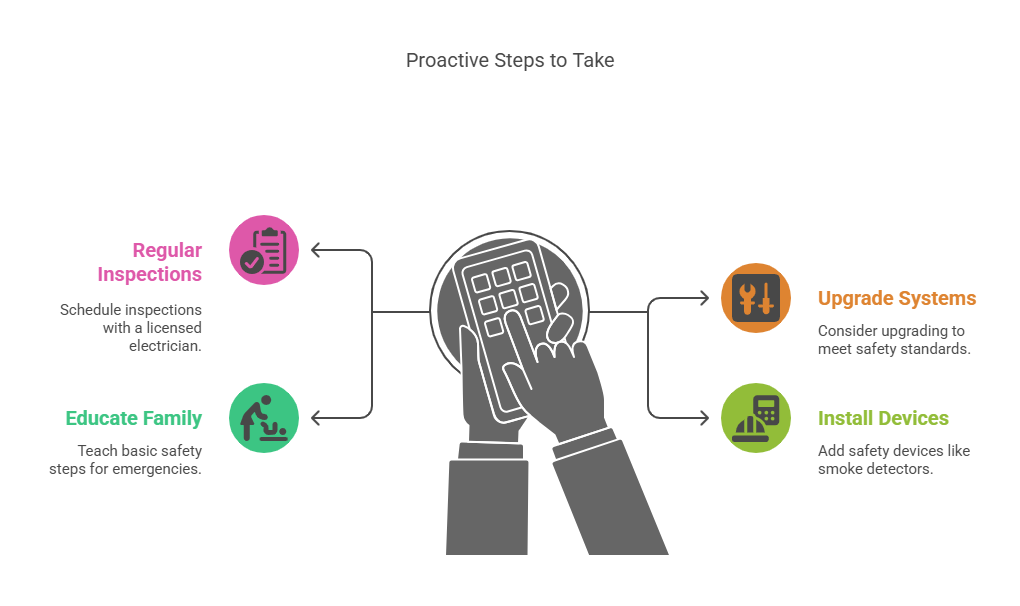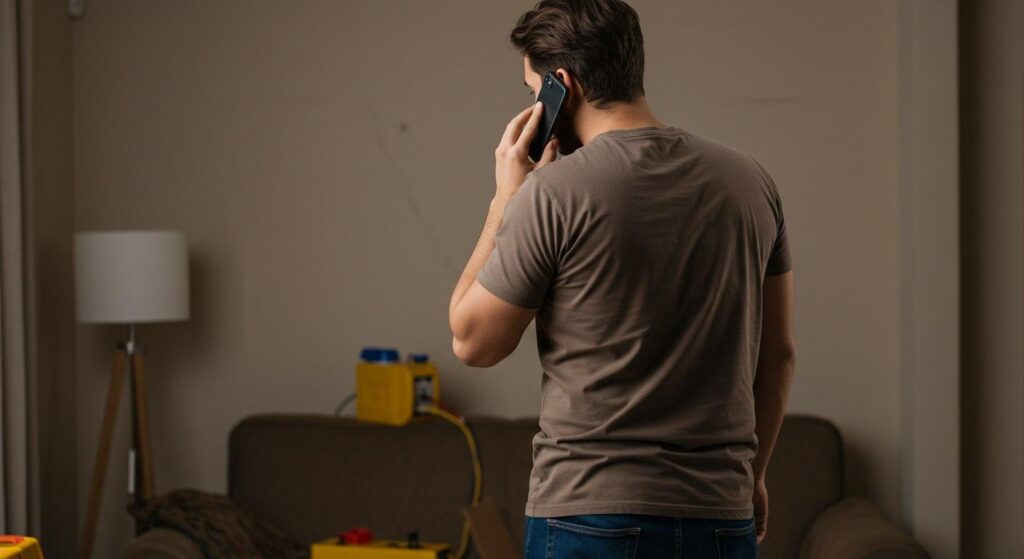Electrical issues can quickly escalate from a minor inconvenience to a hazardous situation. Whether you’re dealing with flickering lights or a complete power outage, knowing when to call an emergency electrician is vital to ensure the safety of your family and your property. In this post, we’ll explore the top seven warning signs that indicate you need an emergency electrical service. By understanding these crucial signals, you can take prompt action and avoid potentially dangerous outcomes.
1. Isolated Power Outages in Your Home
It’s easy to assume that a power outage means there’s a problem with the power company’s grid. However, if only your home is experiencing a loss of electricity while your neighbours enjoy full power, you may have an internal electrical fault. This situation could be the result of issues with your main electrical panel or faulty wiring.
What to look for:
- Complete loss of power in one area or your entire home.
- Circuit breakers that trip repeatedly without an apparent cause.
- Flickering lights that don’t stabilize.
Why it’s dangerous:
A localised outage might seem less severe, but it could indicate serious internal problems such as overloading circuits or damaged wiring that have the potential to start an electrical fire. An emergency electrician has the expertise to diagnose these issues properly, ensuring that your system is safely restored.
2. Burning Smell or Visible Smoke from Outlets and Appliances
One of the most alarming indicators that something is wrong with your electrical system is the presence of a burning smell or smoke emanating from your outlets or appliances. These signs suggest that wiring components may be overheating, potentially igniting a fire.
What to look for:
- Persistent burning odor near outlets, switches, or appliances.
- Discoloured or charred outlet faces.
- Visible smoke or small bursts of flame near electrical fixtures.
Why it’s dangerous:
Overheated wiring and components can quickly lead to a fire hazard. Even if no flames are visible, this smell or smoke is a clear indicator of insulation damage or loose wiring connections. Do not ignore this warning—exit the area immediately and contact an emergency electrician to inspect your system and prevent a potential disaster.
3. Electrical Shocks from Appliances or Switches
Experiencing an electric shock when touching a switch or appliance is never normal, no matter how slight the sensation might be. These shocks may indicate poor wiring or grounding issues that could be a sign of a much larger problem within your electrical system.
What to look for:
- A tingling sensation or minor shock when operating switches or appliances.
- Appliances that malfunction or behave erratically.
- Outlets or switches that feel warm to the touch before a shock occurs.
Why it’s dangerous:
Repeated shocks can be an indication of dangerous leakage currents or wiring faults that might lead to severe consequences, including fatal electrocution. If you notice shocks occurring frequently, it is critical to cease using the affected equipment and call an emergency electrician to evaluate and repair your home’s electrical system.
4. Frequent Tripping of Circuit Breakers or Fuses
Circuit breakers and fuses are designed to protect your electrical system by cutting off power when something goes wrong. However, if you find that your circuit breakers are tripping more frequently than normal or fuses are blowing repeatedly, it’s a sign that your system might be overloaded or suffering from faulty wiring.
What to look for:
- Circuit breakers that trip without a clear, heavy load on the system.
- Fuses that blow repeatedly, even with minor electrical usage.
- Power surges that reset your electronics unexpectedly.
Why it’s dangerous:
Regularly tripped breakers or blown fuses could lead to hidden issues such as short circuits or overloaded wiring. Over time, these conditions not only reduce the efficiency of your system but can also cause significant damage, leading to expensive repairs or replacements. An emergency electrician will inspect your electrical panel and circuits, ensuring that all connections meet safety standards and are capable of handling your home’s electricity demands.
5. Unusual Noises from Your Electrical Panel
Electrical panels are often hidden from view, but unusual sounds emerging from inside them should never be ignored. Buzzing, sizzling, or even popping sounds can be indicators of severe internal problems that warrant immediate attention.
What to look for:
- Any unusual buzzing, crackling, or popping noises coming from your breaker box or electrical panel.
- A feeling of heat when you inspect the panel area.
- Sudden changes in your system’s performance or signs of damage around the panel.
Why it’s dangerous:
These noises are often caused by loose connections, faulty wiring, or even arcing, where electricity jumps a gap between conductors. Each of these issues represents a potential fire hazard and can lead to catastrophic failure if not handled immediately. Contact an emergency electrician to investigate the issue before the situation deteriorates further.
6. Flickering or Dimming Lights
While flickering lights can sometimes result from something as simple as a loose bulb, persistent or widespread flickering (especially when multiple lights are affected) is a clear sign of an underlying electrical problem. This could be related to voltage fluctuations, loose wiring, or even deteriorating electrical components.
What to look for:
- Persistent flickering or dimming of lights occurs regardless of the bulb type.
- A noticeable difference in brightness across different rooms.
- Lights that suddenly brighten and then dim within a short period.
Why it’s dangerous:
Voltage fluctuations and unstable connections can lead not only to annoying lighting issues but also to potential damage to your electrical appliances and devices. In severe cases, these fluctuations might overload your circuits, leading to a short circuit or even a fire. An emergency electrician can identify the root cause of the problem, ensuring that your home’s wiring is stable and safe.

7. Outdated or Damaged Wiring
Many older homes still use outdated wiring that may no longer be sufficient for modern electricity demands. Damaged or aging wiring can degrade over time, leading to issues ranging from minor inconveniences to major hazards.
What to look for:
- Exposed or fraying wires, particularly in older installations.
- Frequent repairs or temporary fixes are needed to keep the system functional.
- Electrical components that seem worn, discoloured, or damaged.
Why it’s dangerous:
Old and compromised wiring is often the source of many electrical hazards. Faulty wiring increases the risk of shocks, fires, and power outages, making it imperative for any suspicious or worn-out wiring to be promptly replaced or repaired. If you notice signs of deterioration in your wiring, it’s time to call an emergency electrician who can provide a comprehensive safety inspection and upgrade your system if necessary.
H2 Proactive Steps to Take

Electrical emergencies rarely wait for you to feel ready. Here are some additional proactive steps that can help reduce the likelihood of encountering a serious problem:
- Regular Inspections: Schedule annual or bi-annual inspections with a licensed electrician to ensure your wiring, panels, and outlets are in optimal condition.
- Upgrade Outdated Systems: If you live in an older home, consider upgrading your electrical system to meet current safety standards and handle today’s power demands.
- Educate Your Family: Ensure that everyone in your household knows the basic safety steps to take during an electrical emergency.
- Install Safety Devices: Smoke detectors, arc fault circuit interrupters (AFCIs), and surge protectors are simple additions that can enhance your home’s electrical safety.
Conclusion
When it comes to your home’s electrical system, there is no room for compromise. Recognising the signs that signal you need an emergency electrician can prevent serious accidents and protect your home from damage. Whether you’re experiencing an isolated power outage, a burning smell, electrical shocks, frequent breaker trips, unusual panel noises, flickering lights, or noticing outdated wiring, it’s essential to take action immediately.
At IBELEC, we understand the importance of prompt and professional electrical services. Do not hesitate to contact a qualified emergency electrician when these warning signs arise. Safety is not something to gamble with—when you detect any of these issues, act immediately to secure the well-being of your household and property.
For further information or immediate assistance, visit https://ibelec.com.au to speak with our professional team. Your safety and peace of mind are our top priorities.

